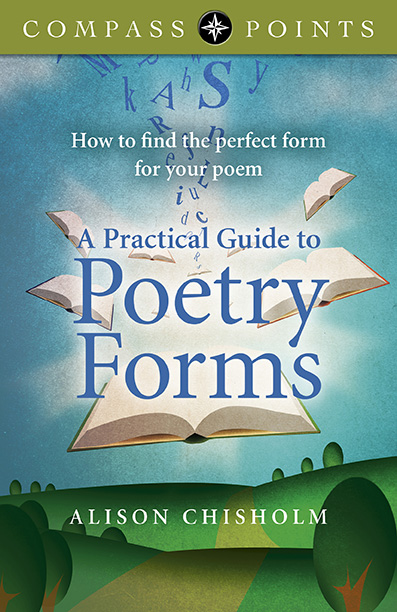Compass Points - A Practical Guide to Poetry Forms
This book shows through a simple, practical approach, how to enrich your poems through fine structuring of form.

This book shows through a simple, practical approach, how to enrich your poems through fine structuring of form.
This book shows through a simple, practical approach, how to enrich your poems through fine structuring of form.
Composition & creative writing, Language arts & disciplines (general), Writing skills
A Practical Guide to Poetry Forms is a practical handbook on poetry forms, giving informative details on the construction of the major set forms. It also includes exercises, all within the scope of the beginner, yet stimulating enough to engage the more experienced poet.
Click on the circles below to see more reviews
Suzanne Ruthven : Author and editor of Writer’s Wheel If you’ve ever been confused by contemporary poetry you can do no better than to read A Practical Guide to Poetry Forms by Alison Chisholm, who always manages to make the obscure and the obtuse accessible to those who have difficulty coming to terms with the different poetry forms. Alison Chisholm has been writing poetry for over forty years and tutoring for twenty; with ten collections published and a further ten textbooks on the craft of writing which proves that the lady’s obviously got what it takes to do and to teach! As usual, this is a practical handbook that provides informative details on the construction of the major set forms, and includes plenty of exercises – all within the scope of the beginner, yet stimulating enough to engage the more experienced poet. Although I love ‘traditional’ poetry in the vein of The Oxford Book of English Verse, or The Golden Treasury, Alison is the only poet I’ve ever met who can impart an interpretation of the mysteries of contemporary poetry without giving the feeling that one is mentally defective for not understanding in the first place! A truly gifted and talented tutor, so if you get the opportunity to attend one of her workshops, don’t miss it – if not, buy her books! Highly recommended. ~ Suzanne Ruthven, Amazon and Goodreads
Alison Chisholm's new handbook should be essential reading for all aspiring poets, and many experienced writers will also find her guidance and explanations to be invaluable, as it serves as a refresher course in the technical side of creating poems. ~ Stephen Wade
If I was to choose any poet to enhance the Compass Points series it would be Alison Chisholm. She has a no-nonsense approach to teaching poetry that can be fully understood by non-poets (like myself) and is a highly respected poet in her own right. She wrote the poetry correspondence course for The Writers' Bureau, which has been going for many years. This is a 'must have' book. ~ Suzanne Ruthven
Most ‘would-be’ poets are so busy exploring the ‘what’ of their writing – the ideas, subject, meaning, content – that they overlook the ‘how’ – the shape, techniques, means, form. Alison Chisholm’s new book COMPASS POINTS: A PRACTICAL GUIDE TO POETRY FORMS is indispensable. In 8 clear chapters she explores the nature of different metrical and rhythmic approaches, and explains in an authoritative and accessible manner the wide variety of available poetic forms, from couplet to free verse. Her exploration is supported by a wide range of appropriate poetic examples, and each chapter is capped by a series of sensibly-challenging exercises. The result? An indispensable book – and not only for the new-comer. Whatever level of your craft, I urge you to buy it; read it; and use it. You’ll be surprised at what you’ll achieve for your writing and your self. ~ Roger Elkin
A well published and technically adept poet herself, Alison Chisholm defines in a lucid manner the many forms and variants that can be used in poetry. She explains a number of factors giving excellent examples and exercises. With her usual expertise Alison guides us through combinations of content and technique. She is precise in this, but her intriguing observations and suggestions ensure that the enjoyment of writing a poem is not lost in the technical detail being discussed. This is a book to be read, dipped into and retained permanently on your bookshelf. ~ Doris Corti